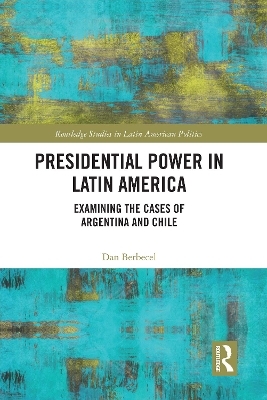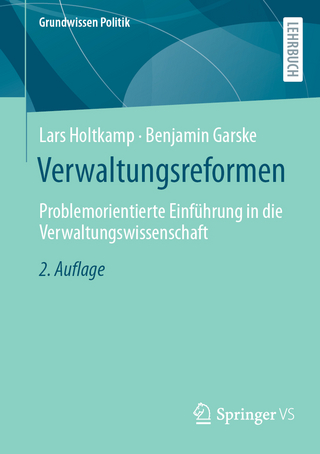
Presidential Power in Latin America
Examining the Cases of Argentina and Chile
Seiten
2023
Routledge (Verlag)
978-0-367-69691-7 (ISBN)
Routledge (Verlag)
978-0-367-69691-7 (ISBN)
What explains variance in presidential power between countries? In Presidential Power in Latin America Dan Berbecel provides a general, systematic theory for explaining presidential power in practice as opposed to presidential power in theory.
What explains variance in presidential power between countries? In Presidential Power in Latin America, Dan Berbecel provides a general, systematic theory for explaining presidential power in practice as opposed to presidential power in theory.
Using expert survey data from Varieties of Democracy (V-Dem) alongside interviews with high-level figures in politics, the judiciary, the public administration, NGOs, and academia in Argentina and Chile, Berbecel argues that constitutional presidential power (formal power) is a very poor predictor of presidential power in practice (informal power). Given the poor predictive value of formal rules, he provides an explanation why hyperpresidentialism emerges in some countries but not in others. Berbecel attributes the root causes of hyperpresidentialism to three independent variables (the strength of state institutions, the size of the president’s party in congress, and whether or not the country has a history of economic crises) which together determine how likely it is that a president will be able to concentrate power.
Presidential Power in Latin America will be of key interest to scholars and students of executive politics, Latin American politics, and more broadly, comparative politics.
What explains variance in presidential power between countries? In Presidential Power in Latin America, Dan Berbecel provides a general, systematic theory for explaining presidential power in practice as opposed to presidential power in theory.
Using expert survey data from Varieties of Democracy (V-Dem) alongside interviews with high-level figures in politics, the judiciary, the public administration, NGOs, and academia in Argentina and Chile, Berbecel argues that constitutional presidential power (formal power) is a very poor predictor of presidential power in practice (informal power). Given the poor predictive value of formal rules, he provides an explanation why hyperpresidentialism emerges in some countries but not in others. Berbecel attributes the root causes of hyperpresidentialism to three independent variables (the strength of state institutions, the size of the president’s party in congress, and whether or not the country has a history of economic crises) which together determine how likely it is that a president will be able to concentrate power.
Presidential Power in Latin America will be of key interest to scholars and students of executive politics, Latin American politics, and more broadly, comparative politics.
Dan Berbecel is an assistant professor in the Department of Political Science at York University (the Glendon Campus) in Toronto, Canada. His main area of research interest is Comparative Politics, with a focus on Latin American Politics.
1. Introduction 2. Comparing presidential power in theory versus. presidential power in practice in Argentina and Chile 3. The impact of the strength of state institutions on presidential power 4. The impact of the size of the president’s party in congress on presidential power 5. The impact of economic crises on presidential power 6. Conclusion Appendix: Using different measurements than the Corruption Perceptions Index to illustrate the correlation between institutional strength and presidential power
| Erscheinungsdatum | 02.12.2021 |
|---|---|
| Reihe/Serie | Routledge Studies in Latin American Politics |
| Zusatzinfo | 25 Tables, black and white; 43 Line drawings, black and white; 43 Illustrations, black and white |
| Verlagsort | London |
| Sprache | englisch |
| Maße | 152 x 229 mm |
| Gewicht | 453 g |
| Themenwelt | Sozialwissenschaften ► Ethnologie |
| Sozialwissenschaften ► Politik / Verwaltung ► Staat / Verwaltung | |
| Sozialwissenschaften ► Soziologie ► Spezielle Soziologien | |
| ISBN-10 | 0-367-69691-6 / 0367696916 |
| ISBN-13 | 978-0-367-69691-7 / 9780367696917 |
| Zustand | Neuware |
| Informationen gemäß Produktsicherheitsverordnung (GPSR) | |
| Haben Sie eine Frage zum Produkt? |
Mehr entdecken
aus dem Bereich
aus dem Bereich
Organisationen steuern, Strukturen schaffen, Prozesse gestalten
Buch | Softcover (2024)
Rehm Verlag
CHF 53,20
Problemorientierte Einführung in die Verwaltungswissenschaft
Buch | Softcover (2025)
Springer Fachmedien Wiesbaden GmbH (Verlag)
CHF 53,15


